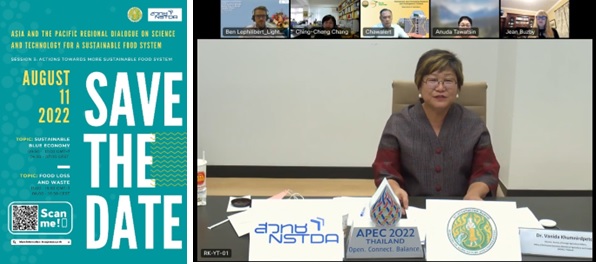The National Science and Technology Development Agency (NSTDA), in collaboration with the Ministry of Agricultural and Cooperatives (MOAC), hosted a webinar on 11 August 2022. The webinar focused on actions in building sustainable food systems and achieving SDGs through international and regional STI research collaboration on food loss & waste (FLW) and sustainable blue economy, as well as addressed the roles of governments and key actor’s partnerships, such as the private sector, civil society organizations, and regional economic community organizations to turn policy into actions and investments in science and innovation.
The presentations in sustainable blue economy session consisted of an overview of sustainable blue economy policy and case studies with the following speakers: 1) Dr. Taworn Thunjai, Department of Fisheries, Thailand; 2) Ms. Mónica Rojas Noack, National Fisheries and Aquaculture Service, Chile; 3) Dr. I Nyoman Radiarta, Chairman of the Agency for Marine and Fisheries Research and Human Resources, Indonesia; and 4) Mr. Prad Kerdpairoj, Thai Union Group PCL. Case studies on innovative technologies and best practices presented include the uses of satellites in doing business by Thai Union PCL and a smart fishery village collaboration in Indonesia. During the workshop, the panelists stressed the importance of science and technology in maximizing the potential of blue economy. Innovative technologies hold keys to enhance aquaculture activities while enabling the monitoring and control of the environmental impacts, especially in the production process, marine resources, and waste management. However, cooperations from the other stakeholders in the value chains are necessary, along with a clear roadmap and effective improvement programs from the government, industry, and fishermen. The Bio-Circular-Green Economy (BCG) model and the new roadmap for a small-scale fishery in Thailand are expected to maximize the potential of marine products, drive the local economy, and improve the well-being of the locals through a smart fishery system and management plans.

Invited speakers in the FLW session - including 1) Dr. Jean Buzby, U.S. Department of Agriculture; 2) Ms. Anuda Tawatsin, Pollution Control Department, Thailand; 3) Mr. Chawalert Trikarunasawat, Department of Agriculture, Thailand; 4) Prof. Dr. Ching-Cheng Chang, National Chung Hsing University, Chinese Taipei; and 5) Mr. Benjamin Lephilibert, LightBlue Environmental Consulting – gave presentations on FLW policy and current innovative approaches to reduce FLW. Several case studies were presented to facilitate the discussion and exploration for the best way to tackle the FLW challenges of the rapidly changing landscape of the APEC food system. It was concluded that collaboration, cooperation, and partnership are needed for an FLW action. Various possible solutions can be implemented based on lessons learned from other countries such as the US where public-private partnerships and consumer education campaigns are in place, and everyone has a role to play in reducing FLW. For instance, uneaten food can be transformed into animal feed and compost or upcycled to new products. In Thailand, the government also established a draft roadmap for food waste management with measurements that follow the Food Recovery Hierarchy principle by focusing on three target groups, namely food retailers, food service providers and consumers. The case study presented by Thai speaker involved the use of solar drying system to make dried chili as a strategy to minimize postharvest loss and reduce mycotoxin contamination. The case study from Chinese Taipei revealed that further studies are required to investigate the market potential and the impact of converting the food waste into other products such as an insect-based protein meal and the cost associated with this conversion. Speaker from LightBlue Environmental Consulting emphasized the importance of capacity building, technologies, methodologies/certifications such as PLEDGE, and the industry’s disruptive standards.
Attended by 158 participants in total, this webinar is part of the seminar series of Asia and the Pacific Regional Dialogue on Science and Technology for a Sustainable Food System. Additionally, it is one of the highlights of APEC 2022 hosted by Thailand. Results and recommendations presented in this webinar will be reported at the APEC Tech to Biz event scheduled for 10-12 October 2022 and the meeting of the APEC Policy Partnership for Science, Technology, and Innovation (PPSTI).
For more information, please click this link: https://www.youtube.com/watch?v=A9ze9zOU59A&t=5341s
